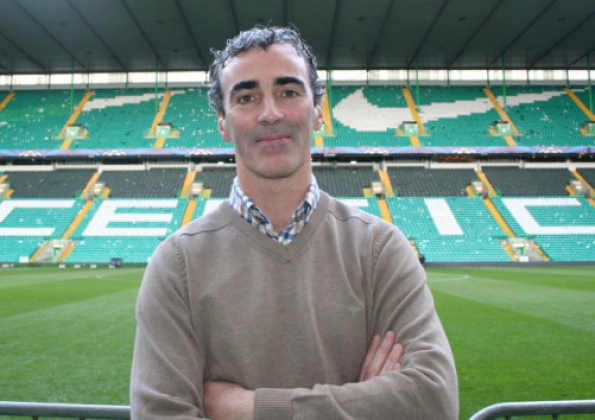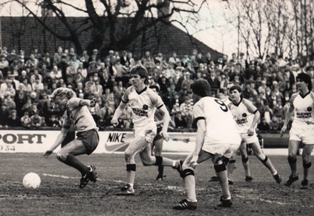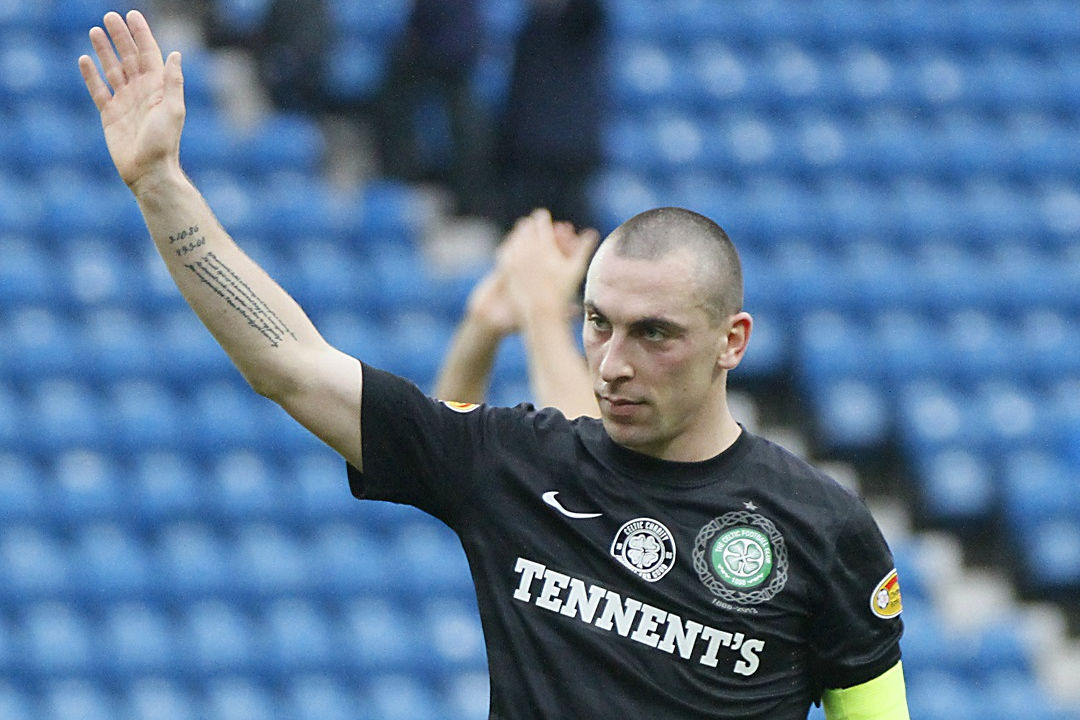However, this level and field of study was also a means to an end. McGuinness was, and still is, passionate about team sports and particularly Gaelic football. An All-Ireland winner as a player, it would not be inarguable to suggest that McGuinness had a quest to become an All-Ireland winning manager also. McGuinness’s coaching abilities were identified and honed at quite an early age. According to Damian Lawlor in the Irish Independent: “At the age of 18 McGuinness was coaching underage [Gaelic football] teams. Columba McDyer, at the time the only Donegal man with an All-Ireland Senior Football Championship medal, approached him one night. He said “I think you are going to be a coach. I want you to have this whistle.”, and presented him with a blue and white whistle. McGuinness still uses the whistle to this day”[i].
Nevertheless, McGuinness’s road to eventual success was anything but smooth. Bit part roles coaching under-age teams had proved to less than fully satisfying and, after repeated requests and applications, McGuinness was appointed as Donegal Gaelic Football Under-21 Manager in 2010.
Almost immediately McGuinness had his work cut out when “before their first training session he called the squad into a huddle and told them they would be celebrating an Ulster title within a few weeks. One player burst out laughing in front of him. It wasn’t out of ignorance or insolence; the youngster giggled aloud almost before even realising. But McGuinness pounced on him. “Do you see that?” he asked the others. “This is where we were at. This is what Donegal football has become. No belief.” Eight weeks later, they were crowned provincial champions”[ii].
Not long after achieving success with the Under 21 side, McGuinness was appointed senior team manager of Donegal. His appointment, however, had quite a harrowing context: Donegal had become derisively dismissed as also-rans, players were despondent and demoralised, and, such was even the negative internal impression within the county, McGuinness was the only candidate when he put his name forward for the job! Even then, McGuinness’s appointment seemed to be laced with reluctance by the men who gave him the job. According to the man himself: “I was the only candidate and I struggled to get it…I don’t know. I don’t know [why there was reluctance by Donegal to appoint him]” he sighs, sipping his tea. “Maybe my face didn’t fit.”[iii].
However, once in the door, McGuinness did not look back. In 2011, Donegal made it to the All-Ireland Gaelic football Semi-Final (losing to eventual winners Dublin) and also managed to win their first Ulster title for several years. The following year, Donegal reclaimed their Ulster title and won the All-Ireland in a triumph that was as innovative as it was comprehensive. ‘The System’, as McGuinness’s strict tactical approach has become known, employed a devastating counter-attacking plan that saw players routinely defend en masse while attack as a devastating wave. A definition that sounds falsely simplistic, this approach saw Donegal quite simply blow the opposition away. Even seasoned GAA commentators and rivals were astounded by Donegal’s quality and impact: “Tyrone’s [manager] Mickey Harte, attempting to analyse the game for the BBC, expressed his shock: “To be honest, I could not see that coming. Donegal annihilated Cork, there is no other word for it”. Martin McHugh, a member of the successful [Donegal All-Ireland winning] 1992 side, said it was the best ever performance by any Donegal team, including his own”[iv].
Considering the achievements, the impact of McGuinness in, not just Donegal but also, Gaelic Football has been revolutionary. As Brendan Crossan explained in The Glasgow Herald recently: “There are thinkers of the game – and there is Jim McGuinness. In his first year, he was lambasted for playing negative [Gaelic] football. In 2012, he was lauded for transforming Donegal into the most devastating counter-attacking team in the country, and undoubtedly the fittest there has been”[v]. In any team sport, this is an accolade that many would accept and few of course would refuse.
The impact of McGuinness has even been noted outside of GAA and Irish circles, a move completely unheard with regards to the global reach and significance of Gaelic sports. The Donegal Democrat was moved to comment that “The Donegal team and their Croke Park heroics were name-checked on several occasions last night on the [Manchester United] Red Devils’ own television channel MUTV. The man doing giving all the praise was none less than Utd [sic] legend and honorary Donegal man Paddy Crerand”[vi].
Paul Brennan also noted on CQN the impressive scale of McGuinness’s success and what he can bring to Celtic: “McGuinness had transformed Gaelic football, since taking control of unfancied Donegal they have been described as “virtually unbeatable”, provoking astonishment and some hostility from those close to the game as a result of his tactical revolution, known as ‘The System’. For his sport, he has found the ‘Moneyball code’ and the metaphorical answer to ‘Why England lose’, which we have discussed here for a number of years. In short, Jim McGuinness sees things that others don’t and Celtic know the value of new ideas”[vii].
Therefore, what does Jimmy McGuinness bring to Celtic? Well, his record should speak for itself – McGuinness is a winner and has a talent for developing and honing winning teams (at least in Gaelic football). However, that notwithstanding, McGuinness’s appointment will increase the move to a more diagnostic, systematic, analytical, and even intellectual approach to breaking down teams, and individuals, fault lines and weaknesses (be it Celtic or the opposition that Celtic are facing). This will enable Celtic keep several steps ahead of weaker opposition whilst also giving Celtic more than fighting chance against stronger competitors and rivals.
Within the British Olympic Cycling team, the team’s psychiatrist, Steve Peters, “takes each cyclist through their ‘foundation stones’. This is a massive list of individual items that can affect performance: everything from diet to disc wheels to a dispute with a significant other. Peters estimates that 50 per cent of his work is with athletes, 50 per cent with ‘significant others’, mainly the coaches. That might seem a little obscure, but not in a system where every area is open to improvement: ironing out relationships between the athletes and the people who work with them is seen as critical. Peters is also behind the athlete-centred training system, where cyclists are given freedom to define their own programmes, the coaches playing the role of expert advisers rather than dictatorial father figures”[viii].
For too long football, especially in Scotland, has been a ‘closed shop’ – too many incompetents and traditionalists have been entrusted with nurturing and furthering all aspects of the game. People like Jim Jeffries, Terry Butcher, and Walter Smith (Gordon Strachan?) have been allowed to neglect progressive and modern approaches and practices at their football clubs for the sake of the short-term. Indeed, in some cases, success was actually absent as tradition was given disproportionate trust and credibility. Scouting, performance management, technique improvement and progression (i.e. aspects of the game that can be analysised and advanced by people from ‘football backgrounds’ and ‘non-football backgrounds’ alike) were all sacrificed at the high altar of convention and insularity. The sport of Football itself has long refused to take on transferrable skills and approaches from other sports instead choosing to believe that their ways – whether recent or not – remain the ‘correct’ ways.
Celtic, through this innovative and impressive appointment, now have their very own version of ‘Steve Peters’ and are arguably leading the way in developing a (so far) unique approach to football coaching, performance analysis and match preparation in Scotland.
Sean has spent over ten years playing, promoting and administering the sport of Gaelic football in Scotland and Britain as part of the Glasgow Gaels Gaelic Football Club – see www.glaschugaels.com and http://www.scotlandgaa.com for more details about Gaelic Games in Scotland





